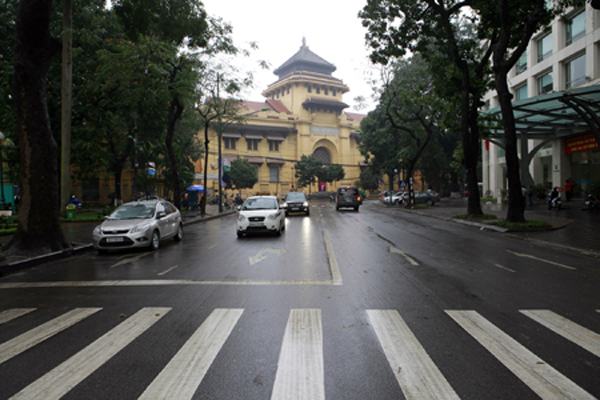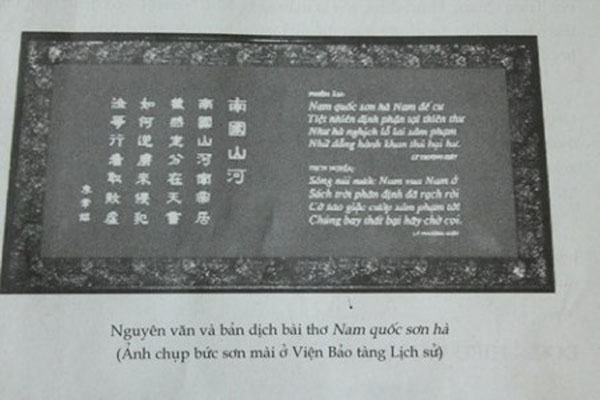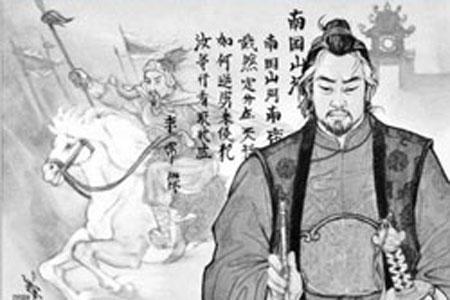I have had no time to check, but I am quite sure that in every major city of Viet Nam, a street bears the name Ly Thuong Kiet. In Hanoi, the Ly Thuong Kiet avenue, two kilometers long, corresponds to the old Boulevard Carreau under the French colonial administration.
Ly Thuong Kiet was a brilliant general in the 11th century (1019- 1105). His real name was Ngo Tuan (Tuan of the Ngo clan). To reward him for his military exploits, he was given the permission to use the family name of the royal Ly dynasty.

As a young man, he showed a passion for literary studies and the martial arts. At the age of 23, he became a eunuch mandarin (noi giam). A great strategist inspired by ardent patriotism, he served under three kings and commanded - at the age of 50 - an expedition against the turbulent kingdom of Champa (1069) in order to establish peace along our southern frontier. He firmly secured the effective authority of Vietnam over the territories ceded by Champa , paving the way for Vietnam's later southward expansion.
But his reputation rests primarily on his victories over the Chinese Song (Tong) aggressors. Let us recall that the first Vietnamese state of the Viet, formed in the first millennium before Christ, was annexed by the Chinese empire for more than a thousand years until A.D. 938.
The following 70 years, short-lived dynasties succeeded each other without being able to establish true national stability. Only starting from the 11th century did the Ly and Tran (1010 - 1400) dynasties succeeded in consolidating national independence, building a prosperous country and endowing it with a prestigious culture in Southeast Asia often called the Thang Long culture. They had to struggle hard to preserve national independence.
The Song (Tong) court did not renounce a reconquest of Vietnam. Its Prime minister Wang An Shi (Vuong An Thach), in the face of the failure of his bold reforms, prepared a great expedition aimed at robbing Dai Viet (Viet Nam) of its wealth.
In 1075, Generalissimo Ly Thuong Kiet who was holding power- the Ly king was then only 10 years old - decided to launch a pre-emptive attack on the Song. Two armies totaling 100,000 men, one going by land under the command of Ly Thuong Kiet, the other by sea under the command of T6n Dan, a chief of the Nung ethnic group, attacked several Chinese districts.
Ly Thuong Kiet managed to win ever a good part of the Chinese population by taking advantage of local discontent caused by Wang An Shi's reforms. After destroying the starting bases of the Chinese army of invasion, he withdrew from Chinese territory.
However, the Song court prepared a counter-offensive by forming a coalition with the Cham and the Khmer kingdoms. In 1077, its troops crossed our border and reached the northern bank of the river Nhu Nguyet (Song Cau). Ly Thuong Kiet was waiting for them on the southern bank. Bitter fighting ensued, but the Chinese were unable to cross the river. Decimated by tropical diseases, they agreed to make peace against the cession to them of five border districts, which were taken back by the Vietnamese two years later.
In his book on Ly Thuong Kiet, Hoang Xuan Han. a brilliant scientist and historian who recently passed away in Paris, made the following judgement: 'There is unanimity in attributing to Ly Thuong Kiet extraordinary merits with regard to the destiny of our nation: the expansion of our territory to the north and the south: the victorious struggle against foreign invasions; and the consolidation of our frontiers, all this leading to respect from our neighbours.

'These aims were achieved thanks to several factors. Under the Ly dynasty, the population had grown fairly large. The government knew how to organise the army, make the most of the perseverance of delta farmers, learn the art of navigation from people of the sea, and put to good use the knowledge of climate and terrain of highland people.
"Ly Thuong Kiet knew how to overcome force by surprise, oppose his strong points to the enemy's weak points, his well-rested troops to the enemy's tired soldiers, patience to arrogance, and. particularly, his people's determination to survive to the vainglory of few individuals on the enemy's side".
"His merits were great, so was his talent for command. His policies both internal an external, showed great perspicacity. He was nor touchy and set great store in the common interest. When the king was still very young, and civil and military power was in his hands, Ly Thuong Kiet could have, like Le Hoan and Ly Cong Uan, taken the throne merely by issuing an order".
The following poem, the only one he left us, was well-known:
"On the river and mountains of the South, the Southern Emperor reigns.
Such is what is written on the Book of Heaven.
How dare those barbarians come to violate our land.
Ignominious defeat shall be their lot!"
Legend has it that in a battle on the river Nhu Nguyet, in which the odds were against our troops, Ly Thuong Kiet boosted morale with a clever strategy. From a nearby shrine dedicated to a national hero, a man with a stentorian voice cried out this poem making it sound as though it was coming from a supernatural source!
In any event, this poem has often been regarded as the fust written declaration of independence of Vietnam The second one was the "Proclamation of Victory over the Wu" written by Nguyen Trai in the 15th century, and the third, the one read by Ho Chi Minh in 1945.



